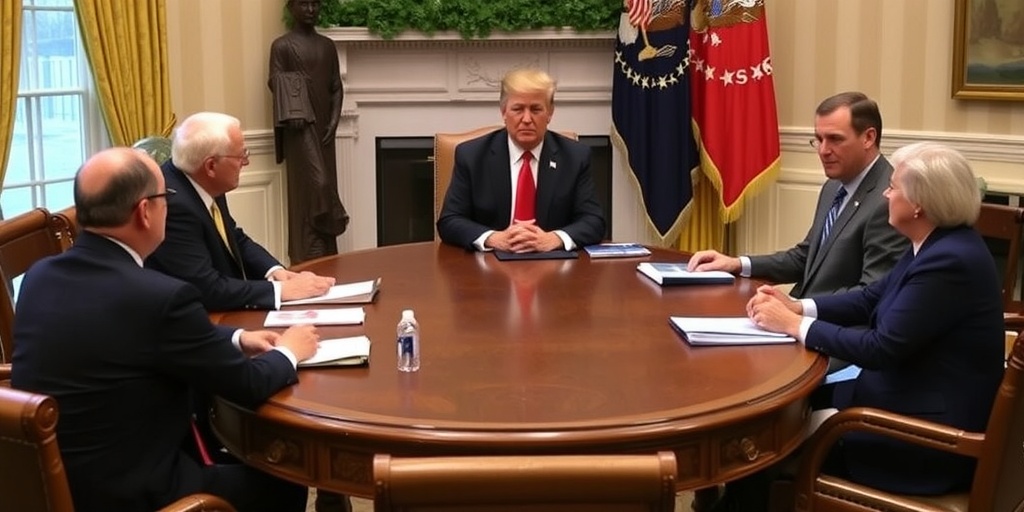Now Reading: Republicans Pursue Risky Regressive Economic Strategy
-
01
Republicans Pursue Risky Regressive Economic Strategy
Republicans Pursue Risky Regressive Economic Strategy

Republican Party Faces Dilemma Over Economic Agenda Following Shift in Voter Base
The Republican Party’s recent electoral victories can be attributed in part to a shifting appeal among working-class voters, a development that has raised questions in Washington about the possibility of a lasting political realignment. However, the economic agenda currently being crafted by Republican lawmakers appears poised to benefit affluent Americans significantly, while simultaneously proposing cuts to essential programs that support the health care and food needs of the less fortunate.
This growing disconnect is causing unease among certain Republican representatives, who fear that they may be alienating their newly acquired voter base. With Democrats strategically criticizing this agenda—arguing that it seeks to "take from the poor to give to the rich"—the party is facing scrutiny reminiscent of tactics that helped Democrats regain power during President Trump’s initial term in office.
As Congress grapples with these challenges, determining who stands to gain and who will be left behind by the Republican plans is becoming critical. Recently, the House of Representatives passed a budget blueprint featuring $4.5 trillion in tax cuts and $2 trillion in spending reductions, along with $300 billion earmarked for defense and border-related initiatives, as well as a proposal to increase the debt limit.
The House vote represents merely the first step in what could be a complex journey toward enacting these plans into law. The Senate, controlled by Republicans, has its own distinct perspectives on the party’s agenda, necessitating an agreement between the two chambers before moving forward with legislation that is likely to follow party lines.
House Republicans who endorsed the budget blueprint express hope that the Senate will ultimately revise the proposal. The financial math involved may require severe cuts to programs such as Medicaid—health care for over 70 million Americans—which has become a contentious issue. Representative Jeff Van Drew, a Republican from New Jersey, has vocalized his opposition to significant cuts to Medicaid, asserting that former President Trump shares these sentiments, particularly in light of their importance to working-class voters.
"Trump does not want Medicaid cuts that affect hard-working individuals. He understands this is the Republican Party’s new majority, and it’s the right course of action," Van Drew remarked. "The Senate is going to address this issue."
The challenge for Republicans primarily stems from the hefty price tag attached to their tax agenda. Despite varying interpretations of how the plans may develop, party members remain committed to tax cuts while also facing pressure from fiscal conservatives to implement spending reductions that can help offset the resulting fiscal deficits. Analysts warn of the regressive nature of significant tax and spending cuts, which may disproportionately benefit the wealthy over the poor.
Kyle Pomerleau, a tax policy researcher at the American Enterprise Institute, a conservative think tank, remarked, "They’re cutting taxes in a regressive manner and cutting spending, which is also regressive."
In a progressive tax system like that of the United States, the wealthiest 1 percent contribute more than 30 percent of annual federal tax revenues, according to data from the Treasury Department. Consequently, tax cuts proposed by Republicans would primarily benefit affluent individuals, even if some working-class Americans see returns.
A key focus for Republican lawmakers this year is the extension of tax cuts initially enacted in 2017. These include lower marginal tax rates across various income brackets, an expanded standard deduction, and an enhanced child tax credit intended for middle and lower-income Americans. While the majority of Americans benefitted from these tax reductions, extending these cuts would yield minimal benefits for those in the lowest income levels, who typically contribute little to federal income taxes.
Data from the Tax Policy Center indicates that the bottom 20 percent of earners—those making up to $33,900—would realize an average increase of merely 0.6 percent, or about $130, in their after-tax income if the cuts are maintained. In stark contrast, the top 1 percent, earning above $1 million annually, would see a dramatic boost of approximately $70,350—an increase of 3.2 percent.
Furthermore, Republicans are contemplating additional tax cuts, which may favor high-income individuals even more. Initiatives such as lifting the $10,000 cap on state and local tax (SALT) deductions—implemented as part of the 2017 tax cuts—would predominantly benefit wealthier Americans with significant property tax obligations tied to high-value homes.
Proponents of the Republican tax agenda argue that such measures can drive economic growth, thereby benefiting working-class Americans through elevated wages. Representative Jodey C. Arrington, a Texas Republican and chair of the House Budget Committee, maintains that coupling tax cuts with spending reductions can invigorate the economy by minimizing federal borrowing required to fund the tax cuts.
Despite these assertions, the plans remain in preliminary stages, lacking concrete details on how to implement the proposed spending reductions outlined in the House budget. Party members insist they do not wish to deprive vulnerable populations of health care, although many seem inclined to retract increased federal assistance for adults under the Affordable Care Act (ACA).
With the ACA allowing the federal government to cover a significant portion of health care costs for individuals earning up to 138 percent of the federal poverty level, the potential cuts to Medicaid funding may profoundly affect millions of Americans. Analysts note that any loss of Medicaid coverage could outweigh the benefits obtained from reductions in income taxes for many low-income families.
During his campaign, Trump suggested various tax policies aimed at benefiting working-class voters, but Republican lawmakers are unsure if they can finance many of those proposals, which may not effectively assist low-income individuals who don’t typically owe income taxes.
As the party navigates this critical juncture, some Republicans express frustration with the outdated agenda of tax cuts for wealthy families coupled with benefit reductions for the poor. Oren Cass, founder of the American Compass think tank and a prominent advocate for the New Right movement, critiques this approach, arguing that Republicans must adapt to their changing voter base instead of clinging to obsolete narratives about fiscal policy.
In summary, as the Republican Party embarks on this new economic agenda, it faces a significant internal and external challenge: balancing the financial interests of wealthy constituents while striving to maintain the support of working-class voters. The unfolding scenario could redefine the party’s identity and priorities in the coming years.
Stay Informed With the Latest & Most Important News
Previous Post
Next Post
-
 01New technology breakthrough has everyone talking right now
01New technology breakthrough has everyone talking right now -
 02Unbelievable life hack everyone needs to try today
02Unbelievable life hack everyone needs to try today -
 03Fascinating discovery found buried deep beneath the ocean
03Fascinating discovery found buried deep beneath the ocean -
 04Man invents genius device that solves everyday problems
04Man invents genius device that solves everyday problems -
 05Shocking discovery that changes what we know forever
05Shocking discovery that changes what we know forever -
 06Internet goes wild over celebrity’s unexpected fashion choice
06Internet goes wild over celebrity’s unexpected fashion choice -
 07Rare animal sighting stuns scientists and wildlife lovers
07Rare animal sighting stuns scientists and wildlife lovers





















